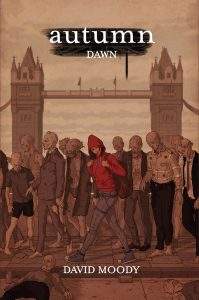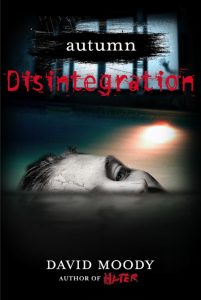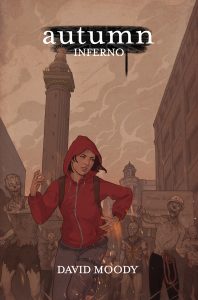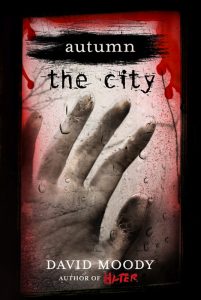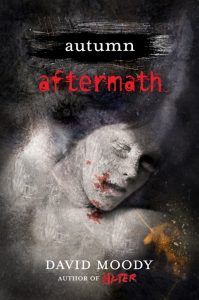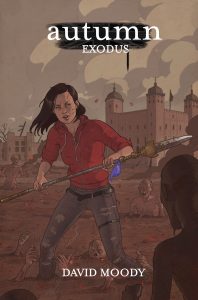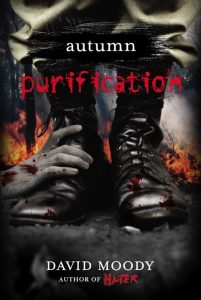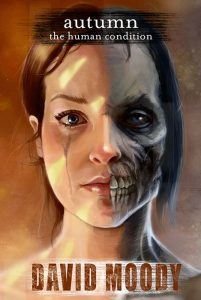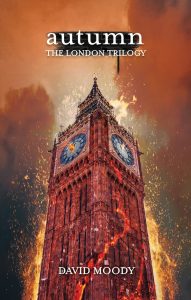Biomass
The village of Calkley is nestled in the shadows of a long hill range in rural Yorkshire, dwarfed and humbled by its majestic surroundings. It’s barely even a village at all, being little more than a row of six small terraced houses, with a gravel car park and play area opposite. The first cottage in the row is a general store that’s served the locals for as long as anyone can remember. The last cottage used to belong to Joe and Hayley Parkinson. Today, Joe lives there alone. He’s the only resident of Calkley to have survived the great disaster that wiped out more than ninety-nine percent of the world’s population with barely a whisper the month before last. There are four other people living in the village now, all new arrivals, and they’re only here because of Joe. He will readily tell you that he might not have had the best education, but the thing he has in spades is common sense. Frigging bucket loads.
Joe gets things done.
On the day the global catastrophe occurred, he barely took a step beyond his front door, and at that point he thought he might never go outside again. Why would he? He was consumed by grief, inconsolable following the inexplicable death of his wonderful wife. Hayley had been his world, his everything. They’d only found out the week before she died that she was pregnant. He’d barely got used to the idea of the two of them becoming three, when two had been brutally slashed to one.
When the full extent of what had happened to the rest of the world became clear (and it didn’t take long – the deaths of his neighbours and the absolute lack of any information or noise coming from anywhere else convinced him he was on his own), Joe forced himself to act. He took control of the situation, as awful as it was.
First, he buried Hayley in the shadow of the hills at the far end of their narrow garden, then dug a pit on the land behind Marie and Andy Walker’s cottage further up the lane and buried the rest of the villagers there. Of course, things had taken a turn for the (even) worse when many of the dead had risen a couple of days later, but by then Joe had become laser-focused on the grim reality of his situation and he took this horrific new development in his stride. He’d taken his time burying Hayley properly but had been less inclined to put as much effort into the others. He came to bitterly regret that decision. He’d barely covered them with anything more than a few of inches of soil, and when most of them got up and got going again, they’d fairly dug themselves out. He still has nightmares about what he saw that day… that writhing, worm-like mass of dirt-covered limbs and torsos, fighting with each other to get out of the ground… unblinking eyes and gaping mouths filled with mud…
Logic dictated – as much as logic applied to anything anymore – that the dead were still dead, that there was no coming back from the grave, so Joe fired a nail gun through the temple of each of them in turn to stop them moving permanently. From that day he resolved to permanently incapacitate any other walking corpses unfortunate enough to get in his way.
If there’s one thing Joe still gives thanks for today (and it’s probably the only thing), it’s that he didn’t have to do the same to Hayley. Though he knew that, in all probability, her dead body was trying to move down there, the fact he’d wrapped her tight in heavy-duty plastic sheeting (they’d bought it for the garden deck he never got around to building) and had buried her under more than a ton of soil, meant she’d never resurface.
He’d hate for anyone to think he doesn’t care. Quite the opposite, in fact, because Joe genuinely is a very sensitive soul, it’s just that first and foremost, he’s practical. He didn’t know what had happened, couldn’t even begin to explain it, but he knew that didn’t matter. All the remorse in the world wouldn’t turn back the clock. He wasn’t interested in the whys and wherefores, all he wanted now was to stay safe and stay alive. The world beyond Calkley had descended into utter madness. He resolved to ensure that life in the village itself remained as straightforward and predictable as possible.
Joe figured there must have been other people like him who’d also survived, so he found sets of solar powered garden lights and draped them around all the local signposts pointing to the village. He also took his dead neighbours’ cars and abandoned them at road junctions for miles around, playing music with the doors left open to get attention. On their windscreens he painted the words: Survivor in Calkley.
It worked.
Within a fortnight, four more people had found their way to the village. No doubt there were others left alive elsewhere, but it was their responsibility to come and find him, not his duty to find them. Perhaps they were too scared to venture out or simply hadn’t wanted to survive? Whatever the reason, that was their business. He was having none of that defeatist bullshit here. If he could pick himself back up after losing Hayley and the baby, they could get over whatever losses they’d suffered, too.
Within a month, the five of them had blocked either end of the road through the village to keep the dead at bay and had turned the place into a small yet relatively safe and self-sufficient community. There were minor differences of opinion, sure, but usually nothing that couldn’t be talked through. A chap called Mortimer who’d worked in construction became Joe’s right-hand man, helping him with the physical work. The only real dissension came from Donald McGuire, a retired engineer who was full of talk but little action, more cautious than most. Donald’s tendency towards negativity was countered by Madeline and Val, two ladies who’d both worked in further education and who could argue him under the table.
As time passed, the nuisance dead began to pose real problems, increasingly reacting to the noise the Calkley folk made, and arriving in larger numbers day by day. Joe, Mortimer, and Maddy were straightforward types, no nonsense. To them, the dead were dead, and they dealt with them accordingly. Using a felling axe that had been handed down from his grandfather to his father and then to him, Joe butchered while Mortimer and Maddy collected up the body parts and burned what was left.
Donald was aghast. He thought it an astonishingly disrespectful way of going about things and could not be persuaded otherwise. In the end it was Val (whose background was in business management and corporate communication) who came up with a workable alternative solution. As more and more dead bodies dragged themselves towards the village, the group of five gathered in one of the upstairs rooms of the shop and listened as she explained.
‘With the best will in the world, what you three have been doing to try and keep the dead under control is never going to be sustainable long-term. I mean look, you’ve only been back indoors an hour or so tonight, and there are as many corpses out there now as there was first thing. All I’m saying is, you can get rid of a thousand of them every day, and it won’t make a single jot of difference. There will still be millions more lining up to take their place.’
‘They’ve got to find us first,’ Mortimer said.
Val gestured at the window. ‘They seem to have been doing a pretty good job of that so far. Listen, we really do appreciate what you’ve been doing, but you’ll drop with exhaustion before those things drop at all. What we need to do is divert them, not destroy them.’
Joe shook his head. ‘I’m not convinced. Unless we properly get rid of them – and you all know exactly what I mean by that – then all we’re doing is kicking the can down the road, so to speak. They’ll still be there somewhere…’
‘Yes, but they’ll not be here,’ Donald said.
‘As long as they’re still mobile, they can come back,’ Maddy said, siding with Joe.
‘Look at the state of them, though. If we can keep them away for long enough, they’ll be in no condition to walk back to us here, never mind attack.’
‘Sounds like you’re trying to find excuses not to get your hands dirty, Don,’ Joe said, unimpressed. ‘It’s me, Maddy, and Mort who’ve dealt with ninety-nine percent of them so far. Imagine how many more we’d have got rid of if you two had helped us out.’
Val sighed and looked up to the heavens. ‘Yes, but even if we’d done that, that ninety-nine percent you’re talking about would still only equate to a tiny fraction of the total number left out there. What I’m proposing is safer, cleaner, and far more humane.’
‘Humane? Humane implies they’re still human,’ Mortimer grumbled.
‘We don’t have to get our hands quite so dirty,’ Val said. ‘Listen to what I’m saying. We won’t have to deal with them that get here if we make it so that none of them can get here at all.’
‘Well, I’d like to see them all gone,’ Maddy said. ‘But I have to admit, what Val’s saying makes sense. Listen, Joe, even if we were all capable of slaughtering them the way you can—’
‘And we’re not,’ Donald interrupted, labouring a point that barely needed stating.
‘—then she’s right, we still wouldn’t have a hope of making a big enough dent in the crowds to make a long-term difference.’
‘I really think this is our only viable option,’ Val said. ‘Have any of you been up to Lymington Hill recently?’
‘Not for a couple of days,’ Mortimer said. Lymington Hill was the highest point for miles around. Easily accessible via a footpath through the fields immediately behind the cottages, it made for an ideal look-out point.
‘I was up there earlier today.’
‘And?’ Joe asked.
‘And there are hundreds of those things converging on us from all directions. That’s what it looked like, anyway. I went along the ridge at least a mile to the east and all I saw was more and more of them coming this way. Because everywhere else is so quiet, we’re all they’ve got to be interested in. Look, what I’m really saying is I don’t think we have any choice. You and Morty already put concrete blocks and cars at either end of the road, but they just keep coming and our defences will eventually be overwhelmed. So, if we want to live – and by living, I mean live decent, proper lives and not just exist, afraid to make any noise – then we’re going to have to take proper, definitive steps.’
Joe looked around the room. ‘Fine,’ he grunted. ‘Let’s hear what you’re suggesting. I’m all for taking control and getting the upper hand, but I’m putting it on record right now, I still think the best way of doing that is by destroying as many of them as we can.’
‘Duly noted,’ said Donald, sounding relieved.
Val held up a sheet of paper upon which she’d drawn a very basic map. X marks the spot.
‘What’s this, frigging treasure island?’ Maddy laughed.
Val ignored her and explained her plan. It was beautiful in its simplicity. The size and location of Calkley lent itself to easy isolation, hidden and protected by the hills. In times past it had made the regional news with regularity – whenever it snowed, the village was the go-to place (if you could get there) for stories about folks being cut-off. ‘I agree with you, Joe, that it would be better for all if we could click our fingers and be rid of all of them for good, but that’s just not going to happen. There are probably better places to go, but we’ve worked hard to set ourselves up here. I’ve got quite attached to the place if I’m honest. I don’t see why we should let dead bodies dictate to us, the living folk, how we should live.’
‘Try telling them that. The dead don’t play by the same rules we do. They’re gonna keep coming, and they’re not just gonna walk past and carry on down the road.’
‘Look at the map. I reckon we can make them do just that,’ Val said. ‘If we can cut them off a way back, before they get anywhere near Calkley, then give them another focus further on down the road, we should be alright. They should bypass us completely.’
‘Another focus?’
‘Wind chimes, bells, music, things like that.’
‘Seriously?’
‘Yes, seriously. It’s quiet as the grave out there.’
‘And you think they’d fall for it?’
‘I think they would, actually. They’re not coming here because of us, they’re coming here because of something. They’re attracted by the noise we make. So, if we set something up way out here to the west of the village, and we make sure the roads and the pathways are all set up right, they should just flow down that way and miss us out completely.’
‘Val’s right,’ Donald said. ‘I think that once we get enough of them gathered in one place, well away from here, they’ll become their own distraction. They’ll keep themselves interested.’
Maddy was cautiously impressed. ‘Make sense, I guess. We just need somewhere else for them to go. We could do with a bloody big pit.’
‘I’ve thought of that too,’ Val said. ‘There were no coal mines around these parts, but I do know somewhere that’s just as good.’
‘Where?’
‘The power station.’
‘That place had been shut down for at least six months before all this happened. They’d decommissioned it,’ Mortimer said.
Val nodded. ‘I know. I did some consulting work up there just before they closed it down. The station itself is useless, but the whole estate is surrounded by a frigging huge metal fence. If we can get the dead in there, they’ll not be getting out again.’
Even problems that appear impossibly complex can have simple solutions. Val had, it appeared, hit the jackpot. The shuttered power station was on the banks of the River Aire, several miles further down the road from Calkley, and it was downhill for the most part, so even gravity would lend a hand getting the dead to keep moving along in the right direction. Joe, Mortimer, and Maddy constructed a route that took advantage of road junctions and established footpaths, as well as the natural lay of the land. Before opening it up to the dead, they used the fortified route they’d forged to get to and from the power station. There, Donald and Val worked to prepare the bait for their trap. Donald had been an engineer and keen hobbyist, and he took great pleasure in designing and building noise-making machines – metal weathervanes and other improvised constructions that would clatter and crash whenever the wind blew or the dead walked into them, calling more of the creatures ever closer. It was impossible to work without a degree of noise, but they kept it to a minimum – short, sharp bursts. Someone would distract the nearest crowds as someone else drove a digger or welded a gate or blocked a way through or whatever. It was hard and slow, stop-start work, but by the end of October, it was done.
Though the dead had become increasingly volatile and unpredictable while they’d been undertaking the work, to the residents of Calkley, it no longer mattered. Despite the biting cold, in early November the five of them took a walk to their regular vantage point at the top of Lymington Hill, safe in the knowledge the climb was so steep that no corpse could manage it.
In the distance, the noise of clattering metal could just about be heard, like an out of tune church bell signalling the start of a Sunday service. Using binoculars, it was just possible to make out the area around the front of the power station. They were too far away to make out precise details, but they could see enough. The shuffling crowds were funnelling into the fenced-off estate in decent numbers.
‘Well done, team, we’ve done an excellent job,’ Donald said, and he meant it. Everyone had played their part. Their communal effort had ensured their collective safety.
Though the bulk of the bodies were behaving as expected, not all of them were playing ball. Joe was the first to spot the problem. The route the group had established around the village had sprung a leak. He alerted Mortimer and Maddy. ‘What’s wrong?’ Maddy asked, bleary eyed. It was barely light.
‘They’ve broken through a fence in the field by the church.’
St Marcus’s was a small, gothic-looking church midway along the road between Calkley and Moorefoot, the next nearest village. Times past, parishioners from both villages had come together there as a combined congregation.
When he’d woken and opened his curtains, Joe had immediately seen movement in the graveyard. Last night it had been empty, this morning it was a virtual mosh pit of writhing undead activity. He could see that there’d been so many of them coming down the lane, they’d inadvertently shoved open a gate. He’d noticed that the gatepost had been unsteady when he’d last checked it. He cursed himself for not doing something about it previously, but there’d been a hundred and one other tasks to see to at the time.
The three of them got tooled up then marched down to the field together, ready to plug the gap and cull the corpses. It took far longer than they expected, and was a damn sight harder, too. They dragged pews from inside the church to fortify the gate and other parts of the hedgerow, then set about dealing with the thirty or more incessant corpses that had managed to squirm through into the graveyard. And the very act of dismembering the dead and piling up the body parts caused another problem, the noise attracting the unwanted attention of another batch of them. Had Maddy not managed to release the handbrake of an abandoned car and roll it down from the front of the church to block another potential way through, they’d have been back to square one.
Donald was waiting for them when they got back to Calkley. He had with him a bottle of scotch, and they passed it around. ‘Good work,’ he said, acknowledging their efforts and their success.
Joe didn’t partake. He was uncharacteristically subdued. From his position outside Donald’s cottage, he could see the bobbing heads of corpses moving down the road. He watched the snaking river of dead flesh that crept away from the village, a parade of damned souls skirting past within a hundred metres of the cottages. ‘I don’t think it’s going to be enough you know.’
‘What isn’t?’ Val asked, immediately concerned.
‘What we’ve done. The dead are too unpredictable. They’re coming in bigger and bigger numbers. We were lucky just now, but we could have been in real trouble. They might not be so easy to control next time.’
Mortimer shook his head. ‘I think you’re wrong, mate. We can cope with this so long as we keep them moving.’
‘Don’t count your chickens.’
‘We could do without your defeatist talk,’ Val snapped. Was she angry or worried? It was hard to tell.
‘I’m a realist, Val. And I’m neither being defeatist nor a bullshitter.’
‘Give us a break,’ Donald said. ‘We’ve done what we needed to do. We’re safe.’
‘For now, yes, but we can’t control their numbers. I’m just worried this is going to come back and bite us.’
‘By the time that happens, the dead will barely be able to walk, let alone fight. You need to stop with this nonsense talk, Joe. You’re not helping anyone.’
‘But there are still so many of them.’
‘We’ve been through this… Val and I have been talking about increasing the noise up by the power station to make sure they stay focused. The more there is to keep them occupied, the less chance there is of them giving us any bother.’
‘That’s not my concern.’
‘What then?’
‘Have you stopped to think where they might be coming from?’
‘I’ve always been more concerned about where they’re going to,’ Val said. ‘I don’t see that it matters much. So long as the dead aren’t in Calkley, we’re good, aren’t we?’
‘My worry is that being stuck all the way out here is both a blessing and a curse. Do you really think they’re all hearing the racket we’re making at the power station?’
‘They must be.’
‘I don’t think so. I think some of them hear it and start moving, and in turn, others follow them. It’ll keep happening. A chain reaction.’
Donald was confused. ‘If that’s really the case then that’s ideal, isn’t it? That’s what we wanted to happen.’
‘You’d think, but look at all the places we’re near to. Leeds, Bradford, Halifax, Huddersfield… all big centres of population. If there’s nothing else between here and there that takes their fancy, the whole bloody lot of them could end up coming our way, a never-ending supply. There could be millions of them on the way.’
‘The more the merrier.’
‘Bloody hell. Seriously?’
‘Yes!’
Joe shook his head. ‘You’re all acting far too complacent for my liking.’
‘Well, your liking isn’t the only thing that matters here,’ Val told him.
‘I just worry that the numbers could get out of control, that’s all. Remember what I said before about kicking the problem down the road? Energy cannot be created or destroyed.’
‘What’s physics got to do with it?’ Donald asked, incredulous.
‘Everything! What was it they used to say in the films? When there’s no more room in hell, the dead will walk the earth.’
‘What’s that got to do with anything?’
‘When there’s no more room at the power station,’ Mortimer said, stifling a laugh, ‘the dead will come back to Calkley.’
‘I’m serious, you idiot,’ Joe said, and with that he went back to his cottage and locked the door behind him.
The others watched him leave.
Val took another swig of scotch. ‘So, what do we do?’
‘About what?’ Maddy asked. ‘All those dead bodies he says are coming our way?’
‘No, about him,’ she said.
‘I’ll keep an eye on him,’ Mortimer said. ‘He’s a good bloke. He’s been through a lot, same as all of us. He held it together better than most at the beginning… maybe now’s the time he’s feeling the strain.’
‘But we’re safer than we’ve been since all this began.’
‘I know that, and you know that. I think deep down he knows it too, but different folks deal with things in different ways, don’t they? It’s only now the pressure’s off slightly that we’ve allowed ourselves to relax. And it’s only when you relax that you start to think about everything you’ve been through… it’s enough to fuck with anyone’s sanity.’
‘I understand that,’ Donald said, ‘but we can’t risk him having an episode. If he goes off on one, then all those creatures on their way to the power station will work out where we are. What do they call it? A self-fulfilling prophecy, or something? There’s a very real danger he could have a tantrum that brings the whole bloody lot of them back to the village.’
But there was nothing for them to worry about. Next morning, Joe’s cottage was empty. He’d gone.
If Joe had returned to the village at any point in the weeks immediately following his abrupt departure, he’d have seen that his words of warning had been heeded, not ignored. The dead continued to be drawn towards the power station in ever increasing numbers, and the four remaining residents of Calkley coped admirably. They opened up other routes across the countryside for the bodies to take, well away from the village, redirecting footpaths and blockading more roads at appropriate junctions to ensure the lifeless masses could do nothing other than keep walking towards the power station. Nearer to the station itself, they created additional distractions to keep the corpses moving. During a risky late-night raid, they adapted an isolated hay barn in a field. By hanging metallic objects across the width of both doors of the barn and directing the dead straight through one side of the building and out the other, the group created a kind of self-perpetuating noise-making machine. Back slaps all round. They were getting good at this now.
Day after day, they climbed to the top of Lymington Hill and watched as the hundreds of corpses converging on the power station became thousands, then became tens of thousands. The grounds of the power station were packed, overfull, but still the dead continued to come. And where they couldn’t get through the border fence, they simply gathered around it. Maddy wished she had a drone with a camera, because it would have been a sight to behold: an impossible number of dead bodies gathered in the same few square miles of otherwise empty space, like a scab on the face of the earth.
It was almost Christmas. The four people left in Calkley felt uncomfortable celebrating this year, but they resolved to try their best. It felt important. It wasn’t going to be like the Christmases of old, that much was certain, but they couldn’t let the end of this year pass without note. Gathered here in their one street, terraced cottage haven, they had a lot to remember, and a lot to be grateful for.
After a dry start, December had become typically dull, grey, and damp. It was uneventful until, one morning, Donald woke the other three, knocking on their respective cottage doors with an urgency that immediately alarmed them. ‘What’s the problem, Don?’ Mortimer asked, anxious.
One word was all he said.
‘Smoke.’
By the time they reached the top of Lymington Hill, the first few wisps of grey smoke that Donald had spied in the distance had become something altogether more concerning. Clouds of billowing black smoke were now belching up into the wintry morning. ‘It’s the power station,’ Maddy said, passing the binoculars around. She was stating the obvious, because the power station was the only thing of any note for miles and miles in that direction.
‘But how?’ Val asked.
Donald was incensed. ‘How do you think? Bloody Joe, that’s how. He’s been determined to destroy the dead from the outset. He’s done this to us.’
‘But why would he wait until now to do it?’ Mortimer asked. ‘Doesn’t make any sense.’
‘It makes perfect sense. He held off until the maximum number of them was over there to destroy in one fell swoop.’
‘I still don’t buy it. There will be more again tomorrow, and even more the day after that and the day after that…’
‘Then maybe today was the day he finally lost his nerve?’
‘I’m not so sure,’ Maddy said.
‘I’m all ears if you’ve got another explanation. There’s no one left but us. How can it not have been him?’
In the distance, the area around the power station chimney stacks glowed red with flames, the intensity of the blaze seeming to increase the longer they looked.
‘Biomass,’ she said.
‘What?’
‘There’s a huge amount of biological waste stored over there now.’
‘And?’
‘And it’s rotting. Changing. Bacterial activity generates heat, heat causes fire.’
‘What bacterial activity?’
‘Within the dead. The more tightly packed they are, the higher the chance of a fire starting.’
‘You don’t know what you’re talking about. Have you completely lost your mind? Do you think they’re just going to start spontaneously combusting? I’ve never heard anything so stupid.’
‘I used to teach the sciences at college, Donald. I’m just offering an explanation.’
‘And you didn’t think to mention this before?’
‘Honestly? No. I’ve had other things on my mind, same as all of us.’
‘I don’t have time for this nonsense. Let’s just hope we get some decent rain before long. That’ll put the fire out.’
‘You think?’
‘You don’t?’
She shrugged. ‘Can’t say for sure. It’s not just heat that’s produced by bacteria, is it? Christ, there must be so much gas built up in that place…’
Donald started back down. ‘I’ve never heard such a load of crap in all my life.’
‘It’s true,’ Mortimer said. ‘Wasn’t there a biomass power station round these parts that went up in flames because of exactly the kind of thing that Maddy’s talking about.’
‘It’s a good thing, isn’t it?’ Val asked. ‘The fire will draw even more of them out. We’ve just got to hope that if there are pockets of gas building up, they—’
And almost exactly on cue, the power station exploded, silencing all conversation.
A massive blast tore through the site. When the initial swell of flames and the dust cloud cleared, they saw that one of the two towering chimney stacks had collapsed to half height. The rumble and roar of the blast could be heard – and felt – for many miles around, amplified by the absolute silence of everywhere else.
The inferno on the horizon had burned relentlessly for several days and showed no signs of abating. The group’s initial dismay turned to cautious relief when the flames appeared to remain contained around the power station site and didn’t spread. They’d imagined nightmarish worst-case scenarios together, where the fire had swept through the amassed corpses and burned all the way back to Calkley. Fortunately, there appeared to be little chance of that happening. If anything, the blaze unexpectedly provided them with more security, the raging inferno becoming the sole focus of every dead body for many miles around, all of them converging on that single smouldering point in the distance.
Maddy and Val stood on top of Lymington Hill, wrapped up against the bitter cold, and watched great floods of corpses sweep towards the devastated power station. Whole swathes of land were swarming with movement. ‘The village looks awful exposed today,’ Maddy said, looking down at the row of cottages below.
‘It doesn’t look any different today than it did last week and the week before that and the week before that,’ she answered, dismissive.
‘No, I guess you’re right, the village itself doesn’t look different… it’s everything else that’s changed. There are so many of those things out there… it’s like the whole landscape’s shifting.’
‘It’s a good thing, Maddy, you have to keep remembering that. Every single one of them that gets burned up in the fire is one less for us to worry about.’
‘You’re starting to sound like Joe.’
Val shook her head. ‘I never disagreed with him saying we should destroy them, I just never saw how we’d be able to do it, that’s all. Mortimer’s done a good job of reenforcing the junctions that keep them moving, and the blockades at either end of the road in and out of Calkley are still holding, so there’s nothing to worry about, is there?’
‘You sound like you’re trying to convince yourself more than me, Val.’
‘All I’m saying is, there’s no need to panic.’
‘And I’m not saying we should panic. I just think we need to be careful, is all. We don’t have any other obvious reference points other than the fire and the village, and we can’t afford to lose sight of what’s happening out there.’
‘I don’t follow…’
‘I come up here most days now, Val, and I’ve been watching how things have changed.’
‘Have they changed at all?’
‘Yes! You’d see it for yourself if you went further west along the ridge. There are so many corpses around what’s left of the power station… they can’t all get close enough to catch fire. They’re just crowding around the place.’
‘So?’
‘So, the crowd keeps growing, and as it does, the gap between us and them is getting smaller. We’re staying in the same place, but because they can’t make any progress, they’re just backfilling.’
‘They’re what?’
‘They’re filling in the spaces. They’re not keeping to the paths we made for them anymore. There are too many of them trying to walk the same routes. There’s a couple of places where fences have come down. There’s another spot where they’ve broken through the hedge at the side of the road and have completely filled a couple of fields… they’re getting awful close, Val, and I just think we need to be aware.’
The dead kept coming. More and more of them, an inexhaustible supply. Less than a week had passed, and the village was now surrounded.
The undead hordes had fought their way to the power station ruin from every direction, overwhelming the roads and footpaths for miles around, clogging them up with death. Their numbers were such that they frequently formed claggy drifts of flesh that forced them up and over any and every barrier. The entire area was swamped.
Mortimer and Maddy constantly patrolled the perimeter of the village, looking for breaches and dealing with whatever nightmares spilled over onto their land. But with the dead so close now, there was nothing they could do with the remains of the bodies they destroyed, other than pile them up. To burn them or bury them would have served only to alert yet more of them to the fact that there were people in Calkley who were still alive.
The world was closing in on the last survivors.
Donald spent all of his time in the spare bedroom on the first floor of his small cottage, moving from the front to the back of the house, checking every window for signs of movement. He no longer needed binoculars to see the foul creatures creeping around Calkley because they were filling the fields on the other side of the road, amassing at the barriers that still (just about) prevented them from breaking through.
Christ, there was one of them right outside his house!
He went out there with a shovel raised above his head, ready to defend himself and his home.
But he stopped. Didn’t strike.
It was Joe.
‘You have to leave,’ Joe said. ‘You can’t stay here.’
He could only have just arrived. Val, Maddy, and Mortimer – who’d all been dealing with separate undead incursions – walked towards him. The five original residents of Calkley stood in the middle of the road, the first time they’d been together in weeks. It was raining heavily, and the noise of the downpour provided a little cover so that they could speak.
Donald pointed at him, incredulous. ‘He says we should leave!’ he said to the others.
‘I think he’s right,’ Mortimer said.
‘But we can’t. We shouldn’t. We’ve got a plan,’ Donald argued.
‘You had a plan, but it hasn’t worked. Time for a new one.’
‘I disagree… we’re still good… we’re still safe.’
‘Joe’s right,’ Maddy said. ‘We’ve backed ourselves into a corner. We had the whole world to ourselves, now we’re limited to this. If we stay here, our space will just get smaller and smaller until we’re all gone. Can’t you see?’
‘Keep your voice down,’ he hissed. ‘They’ll hear you!’
But Joe had had enough.
‘Look at you. You’re the only people left alive for miles around, and here you are, stacked on top of each other, unable to move, hardly able to breathe. You can’t stay here.’
‘He’s right,’ Mortimer said. ‘I’m leaving.’
‘Me too,’ Maddy agreed.
But the other two weren’t going anywhere.
‘We can’t go,’ Val protested.
‘You have to stay,’ Donald said, pleading with Maddy and Mortimer. ‘Please. It was the plan… it is the plan. It’s still working. Just wait a little longer and it’ll all be fine. Don’t listen to him.’
‘I’ve got a place set up,’ Joe said. ‘It’s not far, just a couple of miles. I’ve got everything ready there.’
‘Then why did you come back?’
‘For you! Christ, man, if the dead can see something happening in here, is it such a surprise that I did? Tell you the truth, I’ve been keeping an eye on you. I’d been expecting something to happen.’
Donald finally lowered the shovel. He rested on it now, using it to prop himself up. He seemed resigned. Broken. ‘What’s the point? Won’t it just be the same wherever we go?’
‘I’ve found a stately home. We can get there in a couple of hours. It’s a walled estate. The dead can’t get in.’
‘I don’t understand… you were the one arguing for us to destroy them… you were the one who wanted to get rid of them all…’
‘But it was never about that.’
‘Then what?’
‘I just didn’t want to give up control. I always said that all you were doing was kicking the problem down the road, and I was right.’
‘Come on, Joe,’ Mortimer said, ‘let’s get out of here.’
‘The path over Lymington Hill is still clear. Like I said, it’s a couple of miles walk along the ridge to get to my place.’
‘I’m not going,’ Val said, siding with Donald. ‘I think we can sit this out.’
‘You’re wrong. Come with us now, or you’re just more dead meat.’
Donald turned, the pressure of the moment pushing him over the edge. ‘Don’t you get it, we can’t leave!’ he screamed. Val recoiled at the volume of his voice, then at the dead surging all around them in response to his noise.
‘You’re killing us,’ Donald said, tears of fear, anger, and frustration running down his cheeks.
‘No, Don,’ Mortimer whispered, acutely aware of the effect of his rage, ‘you’re killing yourselves.’
The dead were closing in all around the place now, squeezing through impossible gaps, clambering up and over walls and other blockades and each other, dropping over and hitting the ground, then picking themselves up, bodies broken, and closing in on the altercation in the middle of the road.
‘We need to move now!’ Joe said.
And with that he was on his way, weaving past the furthest advanced corpses, then slipping down the side of his old cottage, passing the back garden where the body of Hayley lay buried. Maddy and Mortimer chased after him.
Val and Donald, though, didn’t.
Val held onto Donald as they reversed back towards Don’s cottage. He swung the shovel around furiously, desperate to ward off the approaching dead, but having little to no effect. Mortimer paused, watching the two of them disappear into the house, hearing them slam and lock the door behind them, thinking he should maybe do something to try and help.
But they’d already made their decision.
As the first few corpses reached the building and began pawing against the walls to get inside, Mortimer turned tail and ran.
Half an hour later, the three of them finally regrouped at the top of the hill. It was icy cold and raining hard, but they were alive and that was all that mattered.
‘This place of yours any good?’ Mortimer asked.
‘Good enough,’ Joe told him. ‘It’ll do for now. We follow the ridge of the valley east, then drop down after a mile or so. We should be okay.’
Maddy wasn’t sure. She was looking at the village from which they’d just escaped. It was hard to see it now, such was the volume of dead flesh that flooded in. ‘You think? We’ll have bloody hypothermia at this rate. We’ve no food, nothing to drink… we’re far from okay, we’re fucked.’
‘No, we’re not,’ Joe said, turning on her. ‘We’re absolutely still in control.’
Val and Donald lived for another three weeks, if you could call it living. They boarded up the windows of Donald’s cottage and blocked the doors. Nothing was getting in.
Or out.
The dead continued to march across the land towards the burning power station, their numbers such that they were no longer restricted to the roads and pathways the group had originally prepared. Like a slow-motion tsunami, they swept across the land unchallenged.
The couple in the cottage tried to be quiet, but it was impossible. And by the time they had been surrounded by so much death that their noises were completely blocked out, it didn’t matter. The creatures were packed tight around the buildings in unfathomable, unmovable numbers.
Donald and Val were trapped.
No food.
No light.
No escape.
No hope.
Characters from this story also appear in WHERE’S WALLY?

